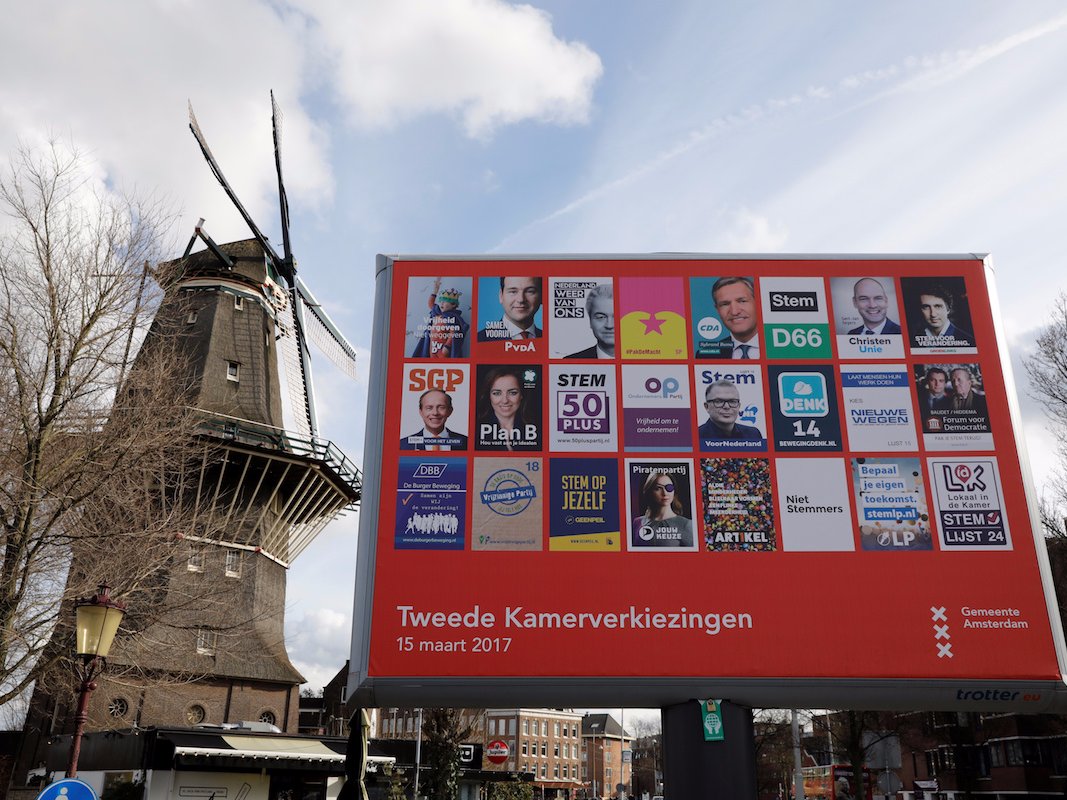
On Wednesday, March 15, the Dutch will vote to elect their next prime minister — the first of many important elections in Europe this year.
The election is particularly meaningful as it is seen as a bellwether for the French and German elections later this year, as a swell of populism is surging through the Western world.
Geert Wilders is the frontman of Dutch populism and, although he is polling very high, the Netherlands’ proportional representation and multi-party parliamentary system will make it tough for him to take power.
Here is everything you need to know about how the Dutch election will unfold.
How it works
The Dutch political landscape is very fragmented, with over 28 parties that Dutch people will be able to choose from in the 2017 elections. In the 2012 elections, 11 parties made it into parliament and the People’s Party for Freedom and Democracy (VVD) and the Labour Party formed a coalition government.
Because of the vast number of parties competing in the election, a coalition between two or more parties is needed to form a majority government. The negotiations to form the coalition generally take several weeks. There are 150 seats in the Dutch parliament and a majority of seats are needed to secure control of the government.
Results will be announced on Thursday.
The main parties
Dutch Prime Minister Mark Rutte. Geert Vanden Wijngaert / AP / Press Association Images
These are the six parties most likely to win the most seats in this year’s election:
The People’s Party for Freedom and Democracy (VVD)
The VVD is the party of the ruling Prime Minister Mark Rutte. It won 40 seats at the 2012 general election and the latest polls show that it could remain the biggest party in parliament, albeit with fewer seats.
The Party for Freedom (PVV)
Geert Wilders, the divisive figure at the head of this anti-immigration euroskeptic party, has led the opinion polls for the last few months and was favourite to win the popular vote. This trend has reversed over the last few weeks, however.
The Labour Party (PvdA)
The Labour party, led by Lodewijk Asscher, won the second-most seats in the last elections but is likely to a lot of ground on Wednesday. The party has been heavily criticised for its support of stark austerity measures.
The Christian Appeal (CDA)
Sybrand van Haersma Buma heads one of the most conservative of the main Dutch parties, the CDA. Historically very religious and socially conservative, the party has become more secular in recent years.
Geert Wilders. REUTERS/Wolfgang Rattay
The D66
Alexander Pechtold leads the progressive and pro-European D66 (Democratic party founded in 1966). One of the party’s high-profile policies is the legalisation of the production of weed. Pechtold has repeatedly feuded with Wilders, especially after the PVV leader tweeted an extraordinary fake picture of the D66 leader surrounded by radical Islamists.
The Green Left
Jesse Klaver, who heads the Greens, is the country’s youngest party leader at 30 years old. His party is campaigning on a theme of “time for change,” which has drawn support especially from younger voters.
Can Wilders win?
Even if Wilders’ populist party were to win the popular vote in the election, it is still unlikely he would become the next Dutch prime minister as many of his rivals have ruled out forming a coalition with the PVV.
The parties that have said they would not work with the PVV include the VVD, CDA, D66, the Green Left, and the Christian Union.
Demonstrators protesting against Dutch far-right election candidate Geert Wilders. REUTERS/Yves Herman
But, Prime Minister Mark Rutte said on Monday there was a real possibility that Wilders could win the popular vote.
“There is a real risk that on March 16 we can wake up in this country and Geert Wilders is leading the biggest party and that will send a signal to the rest of the world,” he told journalists in Rotterdam, according to Reuters, and asked Dutch voters to stop “the wrong populism” at the polls.
It is not clear yet who will benefit from this weekend’s row between the Netherlands and Turkey over two Turkish ministers being barred from addressing rallies in the Dutch city of Rotterdam.
Rutte’s strong response has been praised domestically, but it could also play into Wilders’ hands considering his anti-immigrant agenda. Some of the main themes of the election campaign were have been driven by Wilders’ extreme agenda and revolved around immigration and integration.

















